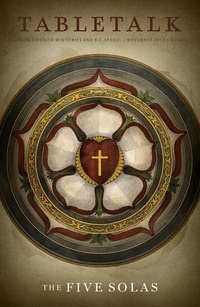R.C. Sproul's Blog, page 506
November 3, 2012
What's One of the Greatest Doctrinal Threats Facing the Church?
I really do believe we are facing the same doctrinal crises that the Reformers faced, only in some respects it's worse because Rome never questioned the authority of Scripture or the inerrancy of Scripture. Both are widely disputed in Protestantism generally, and increasingly in evangelicalism particularly. If we lose the authority of Scripture and the sufficiency of Scripture, then what's the point? There would be no point in trying to understand what we believe and why we believe it—no point in even talking about a Gospel because there would be no authority for this Gospel. Then justification is as much up for grabs today as it has ever been. According to all the studies I've seen, most American evangelicals believe that they save themselves with God's help. That's the prevailing view in all the studies that have been conducted. Do your best. That's why Jesus is no longer seen as the only way, truth, and life. And that wasn't up for grabs in the Reformation—that Jesus is the only way of salvation—that wasn't up for grabs. The issue in the Reformation was how salvation is applied to us, but everyone believed Jesus was the only way of salvation. Today, that's no longer taken for granted. We have to fight for it.
Religious pluralism has not only made us more aware of other beliefs, which is good, so that we're explicit about what we believe and why, it has made us more vulnerable to the belief that religion is really about morality. It's about being nice. It's about being good. It's about loving each other. It's not really about the intervention of God in human history, assuming our flesh, dying on the cross, and being raised the third day for our justification, His return in judgment, and a real Heaven and a real Hell. To the extent that we've already turned religion into morality—something we do rather than something that God has done for us—to that extent, religious pluralism will mean, not only that there are lots of people of different religions we must respect and to whom we have to witness, but rather that there are all of these wonderful people who have their sources of morality just as we do, and we need to realize that there are different paths to God. Increasingly that's where we're going with a lot of pastors, telling believers that Jesus is the best way of pursuing community and self-sacrifice, but not the One who was sacrificed for our sins and raised for our justification.
Read more of this interview conducted in 2009 with Dr. Michael Horton.

November 2, 2012
$5 Friday: The Tabernacle, The Sacraments, & God's Sovereignty

It's time for our weekly $5 Friday sale. This week's resources cover such topics as the tabernacle, the sacraments, God's sovereignty, church history, ethics, suffering, preaching, joy, theology, and more. Thanks to Joshua Press for their partnership this week.
Sale runs through 12:01 a.m. — 11:59 p.m. Friday EST.
View today's $5 Friday sale items.

By Grace, We Are Free in Christ

In John 8:34 Jesus underlined the bondage in which we are held by nature. On the other hand, He spoke about the freedom into which He brings sinners by grace: "If the Son makes you free, you shall be free indeed" (John 8:36).
How could the Son set them free? Because of who He was. He was the Son who has been sent into the world by the Father. He knew the Father's plan. He had the most intimate relationship with the Father. He had heard everything the Father had said, and He came with this message of good news: "The Father has sent Me in order to set you free" (see John 8:28).
How, then, does Christ set us free?
John had answered that question earlier, in the most famous verse in his Gospel. This God, this Father, so loved the world, this world in its sinfulness and bondage, that He sent His only Son into it. He had only one Son, but He sent Him to die on a cross in order to save everyone who believes in Him (John 3:16).
The Son would be "lifted up"—lifted up on a cross, exposed in public shame, hanging between heaven and earth, under the judgment of God against our sins—so that those who believed in Him should not perish but have everlasting life (John 12:32; 3:16).
Jesus Christ is able to set us free because He has dealt with the sin that enslaves us.
We can never atone for our own sin. We can never break its power. We can never come to God and say, "God, surely what I have done is enough to compensate for my sins." Nothing we can do can possibly compensate. But God sent His own Son—think of it, His own Son—who stood in for us, in our place. He lived a perfect life. Since He had no sins of His own to atone for, He was qualified to make a sacrifice for our sins. No sacrifice we could make could ever be adequate to atone for sin. But He was able and willing to do it. Because of that, we can be set free from guilt and from the bondage it creates.
Christ also sets us free in another way: through the truth about God—and about ourselves—that He reveals. If we believe in Him, we will come to know the truth, and the truth will set us free (John 8:32). That is His promise.
I have met some exceptionally intelligent people who cannot understand the Christian gospel. They hear its message as if it were a lecture on morality. Yet the gospel is not difficult to understand. The problem lies within us—in our spiritual blindness. If there is resistance in the heart to loving God, there will be resistance in the mind to knowing God—and therefore to listening to and seeking God. Only the truth can set us free.
Later on in John's Gospel, Jesus spoke about sending the Holy Spirit to His disciples. He would be like a great spotlight shining into their minds, illumining them so that they could begin to see and understand Jesus and what He had done. The Spirit would remove spiritual deception, transform the spiritually dead, and glorify Christ.
So Jesus is able to set us free because of who He is and because of what He shows us.
As a result, we now may dare to call God "Father."
This is the most obvious difference between a "religious" person and a Christian. A religious person is likely to address God—especially in a crisis—as "O God," not as "O Father." There is a simple reason for this. Unless you know God as your Father, you never cry out to Him in your need as "Abba, Father" (Rom. 8:15–16).
This excerpt is adapted from Sinclair Ferguson's By Grace Alone: How the Grace of God Amazes Me .

November 1, 2012
Columns from Tabletalk Magazine, November 2012
 The November edition of Tabletalk is out. This issue features articles examining the five solas of the Protestant Reformation in the sixteenth century. Formulated by the Reformers in response to the abuses and errors of the Roman Catholic Church, the five solas articulate the fundamental tenets of the Christian faith. This issue will explore each sola individually, with the contributors explaining the traditional Reformed view on these pillars of doctine integreal to the faith, life and practice of the body of Christ.
The November edition of Tabletalk is out. This issue features articles examining the five solas of the Protestant Reformation in the sixteenth century. Formulated by the Reformers in response to the abuses and errors of the Roman Catholic Church, the five solas articulate the fundamental tenets of the Christian faith. This issue will explore each sola individually, with the contributors explaining the traditional Reformed view on these pillars of doctine integreal to the faith, life and practice of the body of Christ.
Contributors include R.C. Sproul along with Michael J. Kruger, Guy P. Waters, J.V. Fesko, Joel R. Beeke, John Piper, R.C. Sproul Jr., Bob Kauflin, Geoffrey Thomas, Chris Larson and Conrad Mbewe.
We do not post all of the feature articles or the daily devotionals from the issue, so you'll have to subscribe to get those. But for now, here are links to several free columns and articles from this month:
Wisely Handling the Bible's Wise Sayings by R.C. Sproul
No Other Gospel by Burk Parsons
The Soul of the Solas by R.C. Sproul Jr.
Soli Deo Gloria by John Piper
Worship as a Body by Bob Kauflin
The Call to Ministry by Geoffrey Thomas
A Great Inheritance: An Interview with Conrad Mbewe
God's Provision for the Weary Pilgrim by Chris Larson
If you have not yet subscribed to Tabletalk, now is the perfect time. For those living in the U.S. and Canada it's only $23 for a year, and $20 to renew. You save even more if you get a 2- or 3-year subscription (as little as $1.36 per issue). We offer special discounts for churches or businesses who want multiple copies of each issue.
Get your subscription to Tabletalk today by calling one of Ligonier Ministries' resource consultants at 800-435-4343 or by subscribing online. You can also get free shipping on individual 2012 issues of Tabletalk.

RefNet's New Weekend Lineup

RefNet is 24-hour internet radio that's committed to the historic Christian faith. It's with the help of our many broadcast partners that we can continue to keep this promise. RefNet has been live for just over three months and we've already seen new broadcast partners join. Today, we are pleased to welcome even more.
Beginning this Saturday, RefNet's weekend lineup will also include: Every Last Word, The Basement Tapes, The World & Everything in It, Thinking in Public, and the White Horse Inn.
Every Last Word with Philip Ryken
Saturday and Sunday at 6:00 a.m. and 2:30 p.m.
Every Last Word features the expository preaching of Philip Ryken. By teaching the whole Bible to change your whole life, it aims to broadcast clear, biblical teaching that glorifies God and helps people grow in grace through faith in Jesus Christ.
The Basement Tapes with R.C. Sproul Jr. and Laurence Windham
Saturday and Sunday at 6:30 p.m.
Believing education is conversation, R.C. Sproul Jr. and Laurence Windham join friends and special guests for stimulating conversation on a wide variety of topics relating to the Christian life.
The World & Everything In It
Saturday and Sunday at 1:00 p.m.
The World and Everything In It is an engaging, week-in-review radio news magazine that airs weekends on stations across the country and features reports, interviews, and analysis from WORLD's editorial team.
Thinking in Public with Albert Mohler
Saturday and Sunday at 9:20 a.m. and 8:30 p.m.
Thinking in Public is a forum for extended intelligent conversation about important theological and cultural issues with the people who are shaping them.
White Horse Inn
Saturday and Sunday at 11:30 a.m.
Launched in 1990, White Horse Inn is a theological talk show featuring roundtable discussions on faith, culture, and apologetics. Named after the pub in Cambridge, England, where the Reformation came to the English-speaking world, the White Horse Inn carries on the tradition of the early Reformers with four hosts from different denominational and ethnic backgrounds united on the principle slogans of the Reformation. Hosted by Michael Horton, Ken Jones, Kim Riddlebarger and Rod Rosenbladt.
Here's what our new Saturday and Sunday lineup looks like:
12:00 a.m. Renewing Your Mind
1:00 a.m. Audiobook Series
3:30 a.m. Truth for Life
4:30 a.m. The Pulpit of Saint Andrew's
6:00 a.m. Every Last Word
6:30 a.m. From the Martyn Lloyd-Jones Archive
7:30 a.m. Grace to You
8:00 a.m. The Pulpit of Saint Andrew's
8:50 a.m. Let My People Think
9:20 a.m. Thinking In Public
10:30 a.m. Truth for Life
11:00 a.m. Renewing Your Mind
11:30 a.m. White Horse Inn
12:00 p.m. In The Classroom
1:00 p.m. The World & Everything In It
2:00 p.m. Renewing Your Mind
2:30 p.m. Every Last Word
3:00 p.m. Ligonier Teaching Fellow Hour
4:00 p.m. Desiring God
5:00 p.m. Let My People Think
5:30 p.m. From the Martyn Lloyd-Jones Archive
6:30 p.m. The Basement Tapes
8:30 p.m. Thinking In Public
9:30 p.m. Grace To You
10:00 p.m.Ligonier Conference Series
11:00 p.m. In The Classroom
The above times are in EST. Remember, a schedule for the current day can be seen by swiping forward in the app, or clicking forward at RefNet.fm
Have you shared RefNet with your friends on Twitter or Facebook?
Download RefNet from the App Store™
Listen online at RefNet.fm
Like RefNet on Facebook
Follow @RefNet on Twitter
Watch the Video

October 31, 2012
TULIP and Reformed Theology: An Introduction

Just a few years before the Pilgrims landed on the shores of New England in the Mayflower, a controversy erupted in the Netherlands and spread throughout Europe and then around the world. It began within the theological faculty of a Dutch institution that was committed to Calvinistic teaching. Some of the professors there began to have second thoughts about issues relating to the doctrines of election and predestination. As this theological controversy spread across the country, it upset the church and theologians of the day. Finally, a synod was convened. Issues were squared away and the views of certain people were rejected, including those of a man by the name of Jacobus Arminius.
The group that led the movement against orthodox Reformed theology was called the Remonstrants. They were called the Remonstrants because they were remonstrating or protesting against certain doctrines within their own theological heritage. There were basically five doctrines that were the core of the controversy. As a result of this debate, these five core theological issues became known in subsequent generations as the "five points of Calvinism." They are now known through the very popular acrostic TULIP, which is a clever way to sum up the five articles that were in dispute. The five points, as they are stated in order to form the acrostic TULIP, are: total depravity, unconditional election, limited atonement, irresistible grace, and perseverance of the saints.
I mention this historical event because it would be a serious mistake to understand the essence of Reformed theology simply in light of these five doctrines—the Reformed faith involves many other elements of theological and ecclesiastical confession. However, these are the five controversial points of Reformed theology, and they are the ones that are popularly seen as distinctive to this particular confession. Over the next five posts, we are going to spend some time looking at these five points of Calvinism as they are spelled out in the acrostic TULIP.

Reformation Day Free Download: R.C. Sproul's Luther and the Reformation

"On October 31, 1517, Martin Luther tacked up 95 theses on the church door at Wittenberg. With this act, he hoped to provoke a discussion among the scholars about the abuses of the indulgences by the Roman Catholic Church. He was not trying to create a public furor by any means, but within a fortnight, these theses had spread through the country like wildfire. The last thing Luther had in mind was to start some kind of major controversy, but nevertheless major controversy did begin." —R.C. Sproul
 Many people are unaware of the events of Martin Luther's life that led him to make a courageous stand for the gospel in the sixteenth century. In celebration of Reformation Day, we are offering the downloadable edition of R.C. Sproul's recently released ten-part series, Luther and the Reformation, for free. This series introduces the life and thought of Luther while exploring the lessons we can learn today.
Many people are unaware of the events of Martin Luther's life that led him to make a courageous stand for the gospel in the sixteenth century. In celebration of Reformation Day, we are offering the downloadable edition of R.C. Sproul's recently released ten-part series, Luther and the Reformation, for free. This series introduces the life and thought of Luther while exploring the lessons we can learn today.
Messages included in Luther and the Reformation:
Luther & the Lightning Bolt
Monastery & Rome Crisis
Tower Experience
Building St. Peters
Indulgence Controversy
Progress to Worms
Roman Catholic View of Justification (Part 1)
Roman Catholic View of Justification (Part 2)
Protestant View of Justification
Rome's Objections Answered
Download: Luther and the Reformation
Download: Study Guide (PDF)
This offer is only valid today, October 31, 2012.

October 30, 2012
The Kingdom is Now
Here's an excerpt from The Kingdom is Now, R.C. Sproul Jr.'s contribution to the October issue of Tabletalk.
"I am deeply grateful to my Old Testament professor. Though I was young and foolish while in seminary, I have, by God's grace, been growing less young and less foolish over time. I used to argue with him about as often as I now look back with thanks in my heart. He not only taught me how to understand the Old Testament, but at the same time how to understand the Bible. He taught me that the Bible is one book.
There are two key elements I learned from him that touch directly on the issue of the relationship of Israel and the church. First, he taught that if we want to understand what a text means to us, we first have to understand what the text must have meant to its original audience. The second element could be understood as a corollary to the first—never assume the Bible practices mortar-shell prophecy. This is the notion that God sends a prophet to a particular people, equipped with a particular message. When that message is given, however, it has no meaning to the original audience, but like a mortar shell crossing high above a battlefield to eventually land on the enemy, the prophecy only takes on meaning hundreds or even thousands of years after it is given."
Continue reading The Kingdom is Now.

The Difference Between Our Sanctification and Our Glorification
In this excerpt from a session at our 2010 National Conference, R.C. Sproul illustrates the difference between our sanctification and our glorification.
Transcript
R.C. Sproul sets up an illustration on the stage with "Hitler" on the left of the stage, the "Apostle Paul" just to his right, and "Jesus" on the far right of the stage. He then explains:
"What I want you to visualize here is the gap, the chasm that separates the righteousness of Christ from the most righteous person, or the most wicked person. All the advances in sanctification that our Apostle Paul here has experienced, makes his difference between himself and Jesus, and himself and Hitler, that difference comparatively is negligible. There is still this huge cavern, this huge abyss of difference between sinless Jesus and unglorified Paul. Right?
Now...when you're justified, God counts you as being over here. Right? And when you're glorified, the real separation takes place and you are conformed without sin to your Savior."

October 29, 2012
Twitter Highlights (10/28/12)
Here are highlights from our various Twitter accounts over the past week.
I exhort all, who reverence the Word of the Lord, to read it, and diligently imprint it on their memory (John Calvin).
— Ligonier Academy (@LigonierAcademy) October 23, 2012
Genuine and earnest prayer proceeds first from a sense of our need, and next, from faith in the promises of God (Calvin).
— Tabletalk Magazine (@Tabletalk) October 24, 2012
Christ not only paid the negative penalty for our sin but He positively achieved perfect righteousness. —R.C. Sproul
— Ligonier Ministries (@Ligonier) October 24, 2012
Many who confess Christ are pampering themselves to death rather than pushing themselves to holiness. —Steven Lawson bit.ly/nEgem9
— Reformation Trust (@RefTrust) October 25, 2012
A NEW course "The Trinity in the Early Church" Join Dr. R.C. Sproul as he helps uncover the mystery of the Trinity goo.gl/fhYsI
— Ligonier Connect (@LigonierConnect) October 25, 2012
No one can will the will to will what it will not will! —Sinclair Ferguson ligm.in/TZNf29
— Ligonier Ministries (@Ligonier) October 26, 2012
The only thing that we have earned at the hands of perfect justice is perfect punishment. —R.C. Sproul
— Ligonier Ministries (@Ligonier) October 27, 2012
You can also find our various ministries on Facebook:
Ligonier Ministries | Ligonier Academy | Ligonier Connect | RefNet
Reformation Bible College | Reformation Trust | Tabletalk Magazine

R.C. Sproul's Blog
- R.C. Sproul's profile
- 1931 followers




